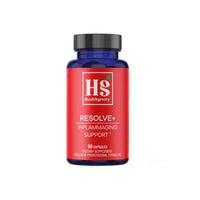Aging is characterized by an increase in the concentration of inflammatory markers in the blood- stream, a phenomenon that has been termed “inflammaging”. The inflammatory response is beneficial as an acute, transient reaction to harmful conditions, facilitating the defense, repair, turnover and adaptation of many tissues. However, chronic and low-grade inflammation is likely to be detrimental for many tissues and for normal functions. Our team investigated various natural solutions targeting multiple influences of inflammaging. Resolve+ contains numerous compounds that have been found to reduce the inflammatory response by targeting a variety of mechanisms.
Acmella oleracea (“jambu”) is sourced from Sardinia, Italy and rich in alkylamides mainly represented by spilanthol. Its flowers are widely used in folk medicine to treat toothache due to tingling, numbness, and local anesthesia caused in the mouth. Acmella oleracea has been shown to be active in fatty acid amide hydrolase (FAAH) inhibition the enzyme responsible for the degradation of fatty acid amides and cannabinoid type 2 (CB2) activation. There are almost 100 studies suggesting the supportive potential for anti-inflammatory, antioxidant, and analgesic effects of Acmella. Studies reported in this review confirmed activities of Acmella, postulating that transcription factors of the nuclear factor-κB family (NF-κB) trigger the transcription iNOS and COX-2 and several other pro-inflammatory mediators, such as IL-6, IL-1β, and TNF-α.
Curcumin, a natural polyphenolic compound derived from turmeric (Curcuma longa L.), has been well documented to exhibit various health benefits. There have been many claims on the health benefits of curcumin on neurological, cardiovascular, lung, metabolic, and liver function, mainly through its anti-inflammatory and antioxidant properties. Despite its promising potential, the clinical application of curcumin has been limited due to its low bioavailability.
To enhance curcumin absorption, we are the first to feature Theracurmin Super® 85X, a proprietary curcumin utilizing the latest technology that transforms standard curcumin into an amorphous structure. Theracurmin Super® 85X uses the latest technology to transform regular curcumin particles into a more bioavailable structure. This is done by splitting curcumin particles’ crystal structure amorphous, therefore, making it easily absorbed and bioavailable to maximize its supportive potential.
Tetrahydrocurcumin (4-HC) is the key bioactive derivative of curcumin, it’s also given credibility as the engine behind all that curcumin brings to the table. With a newfound ability to extract and isolate the compound, research has even seen tetrahydrocurcumin outperform its parent compound in several tests of its capabilities. Researchers have also confirmed that 4-HC attenuated pro-inflammatory indicators like interleukin-1, interleukin-6, TNF-⍺, and prostaglandin E2. After reviewing the data, we found many advantages to infuse tetrahydrocurcumin as CurcuPrime® stacked with Theracurmin Super® 85X into Resolve+.
Quercetin is a well-known studied dietary flavonoid ubiquitously present in various vegetables. Quercetin is known for its antioxidant activity in radical scavenging and anti-allergic properties characterized by stimulation of immune system, antiviral activity, inhibition of histamine release, decrease in pro-inflammatory cytokines, leukotrienes creation, and suppresses interleukin IL-4 production. Multiple studies have confirmed its supportive potential as an immune modulator and its ability to support a healthy inflammatory response. It can improve the Th1/Th2 balance, and restrain antigen specific IgE antibody formation However, chemical instability, poor water solubility and low bioavailability of quercetin greatly limit its applications which is why a phytosome technology which we feature in resolve is the preferred delivery system to overcome these limitations. This enhanced form of quercetin has been shown to be as much as 20 times better absorbed than other quercetin options.
Casperome® boswellia phytosome is a potent extract made from the resin of Boswellia serrata trees and is also referred as Indian frankincense. Boswellia extracts have been demonstrated to be effective in the management of various inflammatory response functions including those that occur in the bowel, joints, bones, respiratory airways and in the brain. The mechanism of action that involves the modulation of the natural inflammatory response both acting on prostanoid synthesis (mPGE2S) and protein degradation (caspases), and transcription factors (Nf-κB). We have selected Casperome® which is a highly standardized in boswellic acids to match the natural composition of boswellia, formulated with phytosome technology to achieve optimized absorption and has been validated by over 10 human studies.
Perilla frutescens is an annual herb belonging to the mint family (Lamiaceae). It is mainly produced in countries like China, Japan, India, Thailand and Korea. Recently, Perilla is gaining more attention because of its medicinal benefits and phytochemical contents. The functional compounds of Perilla Seed Extract are flavonoid Aglycons – polyphenols such as Luteolin, Apigenin, Chrysoeriol, and Rosemarinic Acid. Studies have shown that Perilla seed polyphenols regulate allergic and inflammatory response due to its 5-lipoxygenase inhibitory activity and suppression potential of histamine release from mast cells.
AstraGin® is a natural compound derived from the roots of two traditional Chinese herbs: Panax notoginseng and Astragalus membranaceous which contain astragaloside I, II, IV and ginsenoside Rb1. AstraGin® has been shown to provide full-spectrum gut support through enhanced absorption, microbiota and immune cell viability, and supporting a health. AstraGin® has been shown in numerous studies to increase the absorption of peptides, amino acids, fatty acids, vitamins, and phytonutrients by up regulating the absorption specific mRNA and transporters, such as SGLT1, CAT1, and GLUT4. Additionally, AstraGin® was shown to reduce intestinal inflammatory biomarker MPO, the pro-inflammatory cytokines IL-6, IL-17, and IL-1β in ulcerative colitis patients.
Related products









